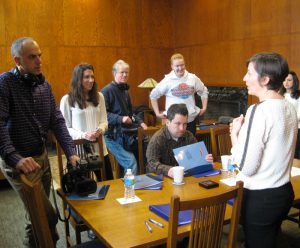
“When the film, Intelligent Lives is featured as part of the 2018 Syracuse International Film Festival’s Imaging Disability showcase October 14, the audience will see how Falk College classrooms and programs are incredible places of inclusion for students with intellectual disability,” says professor of public health and faculty fellow at the Burton Blatt Institute, Katherine McDonald. The film explores how segregation of people with intellectual disability became the norm, why this segregation is slowly being dismantled, and how some people with intellectual disability are blazing a bold new path, including Micah Fialka-Feldman ’15.
In 2013, McDonald received a grant from the Eunice Kennedy Shriver National Institute of Child Health and Human Development, a part of the National Institutes of Health (NIH), to address the pressing need for scientific knowledge to improve the health of persons with intellectual disability for the study, “Project ETHICS.”
During the study, an expert panel created a survey administered to over 500 people across the U.S. to learn about their views on doing research with adults with an intellectual disability. One of the panel members was Fialka-Feldman, a then-Syracuse University student and teaching assistant, who is now a staff member in the School of Education where he teaches and works on projects in the Taishoff Center as well as McDonald’s Community4All Project. Fialka-Feldman, who graduated in May 2015 with a certificate in Disability Studies, helped design the Project ETHICS survey and assisted with recruitment and sharing findings.
During the project, McDonald was contacted by Emmy-nominated documentary filmmaker, Dan Habib from the Institute on Disability (UCEDD) at the University of New Hampshire. He was appointed by President Barack Obama to the President’s Committee for People with Intellectual Disabilities (PCPID) in 2014. Fialka-Feldman also served on the PCPID.
Habib filmed Fialka-Feldman participating in Project ETHICS work at Syracuse University and in public health classes in Falk College in 2016. During multiple site visits to campus, Habib and his team spent time with Fialka-Feldman, his friends and colleagues to capture Micah’s vibrant academic, work and social life. The visits included filming Micah at home, working at the SU School of Education, attending his public health class taught by assistant dean of student services and public health professor, Jim Byrne, and working as part of the Expert Panel on research findings in Project ETHICS with McDonald.
“Having Micah in a class of 100 students was a privilege. He participated in all aspects of the class and shared his life experience in the class and during exams. Micah’s insights about topics in the personal and social health class were thought provoking for the class and for me,” notes Byrne.
“Project ETHICS is community-engaged research. The film is about expanding ideas of intelligence – community-engaged research draws from similar ideas. Rather than trained scientists controlling research, we work hand-in-hand with community members who have lived experience and draw from their expertise to create research questions, methods, dissemination, and action to follow. This way of working legitimizes the value of lived experience, and emphasizes that a broad array of stakeholders can—and should—contribute to research,” explains McDonald, principal investigator for the study.
Since 2016, numerous research articles about Project ETHICS have been published, on which Fialka-Feldman is co-author. “This film is a key component to challenging dominant cultural narratives about people labeled with intellectual disability. We need films that reflect disability rights, and showcase people with disability leading meaningful lives as caring, capable citizens” says McDonald.
The Intelligent Lives screening will take place on Sunday, October 14 at 3:00 p.m. in Shemin Auditorium, Shaffer Art Building. The film is captioned; ASL interpretation and CART will be provided for the introduction and discussion. Watch the trailer of the film.
Throughout the month of October, the Disability Cultural Center (DCC) and a host of campus partners and student organizations will host Disability Awareness and Appreciation Month. The month’s events will focus on disability and its many intersections. For more information, visit the Syracuse University story.
